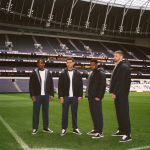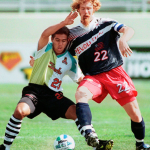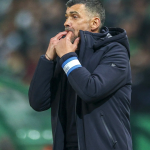
Red Bull system between pitch and marketing
Facing Bayern Munich tonight, Salzburg demonstrates the ambition of the beverage project that gives wings
March 8th, 2022
For years the Red Bull brand has not only been associated with the energy drink with thaumaturgic qualities but, starting from extreme sports, it has spread its wings and in a short time has become an increasingly concrete reality in the world of soccer. First with Salzburg, then Leipzig, New York, Bragantino, teams located in the four corners of the earth and that now wear on their chest the same two red bulls with a yellow sun in the background. A growth as rapid as it is steep, which has stimulated the usual polarization between those who reject the Red Bull method and those who instead appreciate its competence and long-term planning. Adopting an entrepreneurial perspective, when one speaks of Red Bull, and more specifically of Red Bull Salzburg, one has the perception of witnessing one of the most fruitful branding strategies of recent years, with the Austrian company imperiously colonizing the world of sports, making its logo one of the most recognizable in the world.
Although Red Bull in the world of soccer has been displayed a strong iconoclasm towards teams and communities, and on the one hand has created numerous misunderstandings and popular discontent, on the other hand it has led to an incredible awareness boost. In fact, after the acquisition of Salzburg, the Austrian company tried to expand globally, passing through Germany, in Leipzig, and landing in other continents: the Red Bull empire, in fact, in addition to the main football club in New York, in 2007 decided to land in Brazil, first founding the Red Bull Brasil, and then deciding to acquire the Clube Atletico de Bragantino in order to compete in the Brazilian first division.
As a demonstration of this, it can be said that Red Bull football clubs have an identity and a real DNA that they were able to establish in a relatively short time. In particular, Leipzig and Salzburg seem to have established themselves as two factories of talent. Haaland, Daka, Mané, Naby Keita, Szoboszolai, Upamecano, and Minamino are just a few of the names that have grown up within the Red Bull sphere between Leipzig and Salzburg. The following is a tangent example of how the company in question aims to do branding - with the purpose of increasing the appeal of its teams - also through the cultivation, growth, transformation and affirmation of its own talents that today play in top European teams. A model that seems to be very similar to Lille's, which has done the same by selling players like Maignan, Osimhen and Rafael Leao for staggering amounts of money.
A methodology that provides for a complete valorization of its assets, from their creation to their sale. A development that obviously also includes the communication aspect, taken care of in every detail, of the players they own. A clear example is present on the Instagram profile of Leipzig, which shows several stories in evidence dedicated - each - to a player of their team, demonstrating how they are fully aware of the fact that the players cover a significant part of their assets.
Moreover, since the first seasons under the aegis of the two bulls, both Salzburg and Leipzig have set up an extremely reactive football, based on a system of asphyxiating pressing and very high intensity, as if the eleven on the field were the testers of the beverage whose logo they carry on their chests. The Red Bull system, in fact, in addition to a large number of players, has also formed a new generation of coaches, from Marco Rose to Julian Nagelsmann, closer to Football Manager than to the playing field. A revolution, that of the Laptop Coaches, that Red Bull has strongly promoted, becoming the ideological flag of a technical management based more on advanced statistics and excel sheets than on locker room stories and repetitions on the steps.
The distance between this calculating football, almost created in a laboratory, and the romantic soccer of the curves on Sunday afternoons, to the point of losing one's voice, has created an often irreversible split in those realities that existed before the advent of Red Bull. In Salzburg, the advent of the Red Bull dynasty in soccer has imposed itself - in the eyes of the historical fans of the original "Austria Salzburg" club - in a decidedly destructive manner. Starting with the cynical statements made in 2005 by the new president Dietrich Mateschitz who, by acquiring the club's license when was at risk of bankruptcy, quickly disintegrated the identity built up over years of history of a glorious club that had faced Inter in the 1994 Uefa Cup final.
If the acquisition of the club's license generated an animated reaction from the Salzburg's hard core fans, total disapproval was reached when the new ownership imposed new social colors, very far from the color blocking purple and white that had always distinguished the club, and instead linked to the canned drink that had become the Main Sponsor. The story in question is a demonstration of how entrepreneurship in soccer is received, in some cultures and for some fans, in a very imperialist and colonizing way. The decision of the fans to found the "New Austria Salzburg" immediately after the ruthless operation of the new ownership is one of the most concrete demonstrations of love of a group of fans towards their territory and has led them to start again from the seventh Austrian division, taking 10 years to return to professional soccer.
The new Austria Salzburg, has very clear ideas for the future, which can be considered as a model for many other clubs that want to start a team from the bottom and the community. In fact, the Austrian club has as its main objective to be a sustainable reality, which, to the full extent of its possibilities, has in mind to design a new stadium and use half of it as a popular residence. The patient approach adopted by the new Austria Salzburg could influence clubs in other European countries - such as Italy, which has recently witnessed the vicissitudes of similar clubs - for a healthy and reasoned rebirth, which has the duty to focus on the passion of the fans and, obviously, on the untouchable coloring of the team uniforms.
The phenomenon of the Red Bull ecosystem attests to many questions about certain situations and dynamics that may develop in the world of contemporary soccer: if today it seems that many entrepreneurs and club owners have understood how to generate recognition for their teams, at the same time it seems to be very difficult to keep fans in tune with corporate and managerial choices. Entrepreneurship in the world of soccer is certainly not a recent development, but the challenge of the men of the football business will be not to lead to a divisive choice between the passion of the fans and financial income, but to create a common thread able to grow hand in hand identity, infrastructure, DNA of the club, without acting unfairly towards the fans, who must remain the main stakeholder of the team.






















